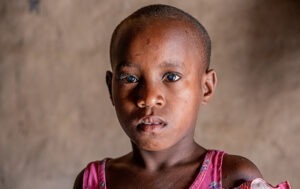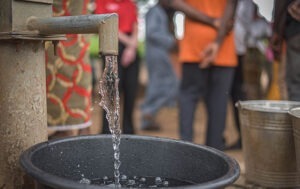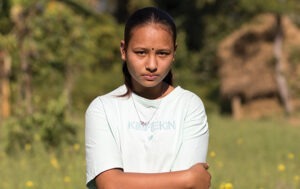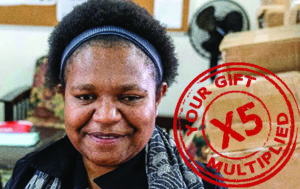Mary
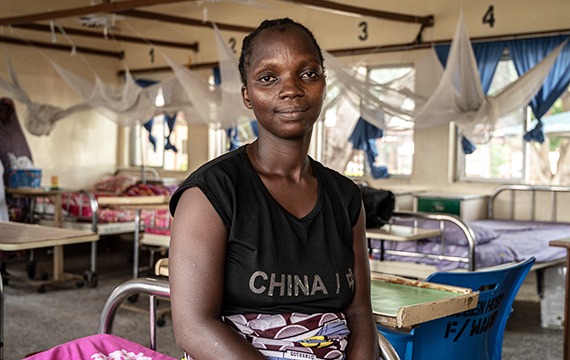
So much loss, then endless leaking. Four stillborn children, then obstetric fistula. Help mothers like Mary find hope and healing beyond the smell, shame and isolation!
Please send your life-changing gift today!
“Come to me, all you who are weary and burdened, and I will give you rest.” – Matthew 11:28
What greater burden could there be for a mother like Mary in Nigeria? One by one, she lost all four of her babies, just as they were being born. Heartbreak after heartbreak. All her children, stillborn.
It is hard to imagine such loss and grief. Yet Mary’s unimaginable pain is made even more agonising, by the debilitating condition of obstetric fistula. Urine was seeping out from her and would not stop.
Today, for mothers exhausted and suffering by their constant leaking of urine and even bodily waste, please send your generous gift to help restore their lives and dignity.
Support from caring people like you has made it possible for cbm-funded health workers to reach some of the world’s poorest and most remote places, finding mothers hidden away because of the smell, shame and isolation of obstetric fistula.
Mothers completely isolated and ashamed because they could not control their leaking of urine and sometimes bodily waste.
This happened to Mary during her fourth labour which stalled. Her baby was trapped for too long. The aunts and grandmothers around her tried to help, but often in communities like this, there are simply no trained birth assistants, midwives or doctors.
During the birth, the baby’s head pressed for too long on the wall of Mary’s birth canal. Blood flow was blocked and a tiny piece of Mary’s flesh died.
As a result of this prolonged labour, tragically, the baby was stillborn.
Mary’s grief was unmeasurable.
Adding to this, within hours of her baby dying, that small fragment of oxygen-starved flesh quickly wore away, leaving a tear. Urine began to leak through Mary’s birth canal.
Mary was shocked when her clothes became soaked with urine. What was happening? She swathed herself with sheets, trying to stem the flow. Grief upon grief became her life.
The heartbreak of baby deaths is still experienced in New Zealand, but the numbers are low. Sadly, it is very common in parts of Africa – particularly rural Nigeria. In Mary’s world, childbirth remains a time of extreme danger for both mothers and their babies.
Chances are, if Mary had been here in New Zealand, she would have children laughing and playing around her now. She would most definitely not be leaking urine!
Please prayerfully consider standing with these precious mothers in Nigeria, by sending your gift for obstetric fistula care to bring healing in body and heart for mothers like Mary.
Mary’s mind was reeling. “I did not know what this condition was.” The grief and confusion of what was happening to her body were overwhelming for her.
And her life in poverty gave no respite. Despite this debilitating health condition, Mary had to step back into the bustling marketplace, simply to survive.
“I’m always worried, whenever I go where people are. I am very conscious and fearful that my urine will leak out,” she said.
What a challenging situation in which to live! Unable to afford medical treatment, Mary turned to traditional herbal medicines. They often don’t achieve much, but usually do no harm. Not for Mary, though. They caused her terrible stomach pains and a gut infection.
One day Mary’s stressed and traumatised body could take no more: “I collapsed in the market. One of the herbal medicine men told me to go to a local hospital, and that this condition can’t be cured by herbal medicine!”
In a way, her collapse and the medicine man admitting defeat were the turning points in her life. Mary and her husband went to the hospital for help with her infection. When the staff realised that this very unwell woman was also leaking urine, they knew she had an obstetric fistula.
Sadly, that hospital could not help her, because obstetric fistula surgery requires specialist training. But thankfully, they referred Mary to a cbm-funded specialist hospital in Abuja, Nigeria’s capital, where amazingly kind and wonderful people like you are helping to set mothers free from obstetric fistula.
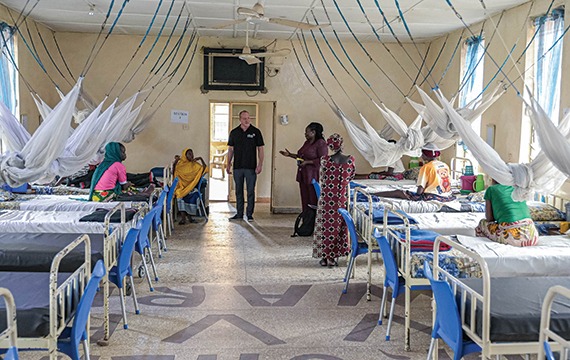
This specialist hospital is called SFHF – Sustainable Family Healthcare Foundation, and is where mothers, like Mary, come from all over Nigeria to receive a life-changing blessing: freedom from their leaking.
In New Zealand, information about health programmes is usually just a phone call away – but in many of the world’s poorest places, mothers like Mary are left to search desperately for any hint of help that might bring relief from their debilitating medical condition. Sometimes it is word of mouth, but there is heavy stigma around obstetric fistula. Some might hear about it on a village loudspeaker or radio. However they hear it, though, imagine how those words of hope must feel. Like a miracle.
Please let that hope be heard throughout places like Nigeria, so mothers like Mary can find their freedom from obstetric fistula. Send your gift today, so mothers with obstetric fistula can find release from their endless misery.
The good news for Mary is that she was able to find her way to specialist obstetric fistula treatment. She arrived at SFHF unable to afford her surgery and fearing rejection, only to discover that her operation and her hospital care would be totally free, sponsored by incredible people like you!
Mary was embraced by the staff. They welcomed her with love and kindness. In a skilful operation, a well-trained surgeon closed her fistula and returned her to complete wholeness. Her body repaired. Her dignity restored. Her life renewed – thanks to generous people like you!!
She had arrived at the hospital just a mere shell of the woman she once was. Instead of being the usual confident market seller, she was utterly broken in heart and spirit. She’d had to keep herself tightly wrapped to avoid the leaking and the smell. She rubbed her skin raw trying to stay clean, but she could never stop the leaking on her own. She risked serious kidney and liver damage through dehydration, because she was so afraid to drink water…
We don’t know how Mary had the courage to pull herself through each day while having to earn a living in the marketplace, wondering if every sideways glance was because of her smell.
Mary is so grateful to caring people like you.
After her successful surgery she said something that she thought she would never say again: “I am so happy”. That is a startling transformation for someone who has known such grief.
What an amazing testimony! But right now there are more mothers, like Mary, in desperate need of life-changing surgery. They are trapped in the debilitating condition of obstetric fistula. They may not even know that a treatment for this exists. But with your help, their lives can begin anew. Just think what your gift today could provide…
Your gift will help find mothers hidden in shame and isolation living with obstetric fistula. It will help support life-changing obstetric fistula surgery, aftercare medication and livelihood programmes to help mothers live independently. And it will help train healthcare staff around the prevention of obstetric fistula.
Mary’s loss shows how much precious mothers in Nigeria, living with the life-long smell, shame and isolation of obstetric fistula, need love and support through kindness like yours.
If they were here in New Zealand, they wouldn’t be living with obstetric fistula. But they are not. They often cannot rely on anyone in their community to provide maternal healthcare and obstetric fistula surgery.
Think of the joy you will bring, in place of loss, grief and shame. Thank you for being part of bringing hope to mothers like Mary – a mother indeed, despite all her heartbreak.
We can’t stop thinking of Mary’s loss. Four stillborn children, then being soaked with urine, all because of a tiny wound in her birth canal. It is more than any woman should ever bear. Please help, by sending your generous gift for mothers living with obstetric fistula today. Thank you for your kind and caring heart.

